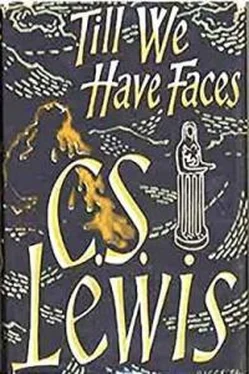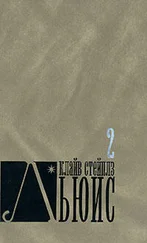“Who is Ungit?” said he, still holding my hand.
Then he led me across the floor; and, a long way off before we came to it, I saw that mirror on the wall, just where it always had been. At the sight of it my terror increased, and I fought with all my strength not to go on. But his hand had grown very big now and it was as soft and clinging as Batta’s arms, or as the tough clay we had been digging, or as the dough of a huge loaf. I was not so much dragged as sucked along till we stood right in front of the mirror. And in it I saw him, looking as he had looked that other day when he led me to the mirror long ago.
But my face was the face of Ungit as I had seen it that day in her house.
“Who is Ungit?” asked the King.
“I am Ungit.” My voice came wailing out of me and I found that I was in the cool daylight and in my own chamber. So it had been what we call a dream. But I must give warning that from this time onward they so drenched me with seeings that I cannot well discern dream from waking nor tell which is the truer. This vision, anyway, allowed no denial. Without question it was true. It was I who was Ungit. That ruinous face was mine. I was that Batta–thing, that all–devouring, womblike, yet barren, thing. Glome was a web; I the swollen spider, squat at its centre, gorged with men’s stolen lives.
“I will not be Ungit,” said I. I got up, shivering as with fever, from my bed, and bolted the door. I took down my old sword, the very same that Bardia had taught me to use, and drew it. It looked such a happy thing (and it was indeed a most true, perfect, fortunate blade) that tears came into my eyes. “Sword,” said I, “you have had a happy life. You killed Argan. You saved Bardia. Now, for your masterpiece.”
It was all foolishness, though. The sword was too heavy for me now. My grip—think of a veined, claw–like hand, skinny knuckles—was childish. I would never be able to strike home; and I had seen enough of wars to know what a feeble thrust would do. This way of ceasing to be Ungit was now too hard for me. I sat down, the cold, small, helpless thing I was, on the edge of my bed, and thought again.
There must, whether the gods see it or not, be something great in the mortal soul. For suffering, it seems, is infinite, and our capacity without limit.
Of the things that followed I cannot at all say whether they were what men call real or what men call dream. And for all I can tell, the only difference is that what many see we call a real thing, and what one only sees we call a dream. But things that many see may have no taste or moment in them at all, and things that are shown only to one may be spears and waterspouts of truth from the very depth of truth.
The day passed somehow. All days pass, and that’s great comfort; unless there should be some terrible region in the deadlands where the day never passes. But when the house slept I wrapped myself in a dark cloak and took a stick to lean on; for I think the bodily weakness, which I die of now, must have begun about that time. Then a new thought came to me. My veil was no longer a means to be unknown. It revealed me; all men knew the veiled Queen. My disguise now would be to go bareface; there was hardly anyone who had seen me unveiled. So, for the first time in many years, I went out bareface; showed that face which many had said, more truly than they could know, was too dreadful to be seen. It would have shamed me no more to go buff–naked. For I thought I would look as like Ungit to them as I had seen myself to be in that mirror beneath the earth. As like Ungit? I was Ungit; I in her and she in me. Perhaps if any saw me, they would worship me. I had become what the people, and the old Priest, called holy.
I went out, as often before, by the little eastern doorway that opens on the herb–garden. And thence, with endless weariness, through the sleeping city. I thought they would not sleep so sound if they knew what dark thing hobbled past their windows. Once I heard a child cry; perhaps it had dreamed of me. “If the Shadowbrute begins coming down into the city, the people will be greatly afraid,” said the old Priest. If I were Ungit, I might be the Shadowbrute also. For the gods work in and out of one another as of us.
So at last, fainting with weariness, out beyond the city and down to the river; I myself had made it deep. The old Shennit, as she was before my works, would not, save in spate, have drowned even a crone.
I had to go a little way along the river to a place where I knew that the bank was high, so that I could fling myself down; for I doubted my courage to wade in and feel death first up to my knee, and then to my belly, and then to my neck, and still to go on. When I came to the high bank I took my girdle and tied my ankles together with it, lest, even in my old age, I might save my life, or lengthen my death, by swimming. Then I straightened myself, panting from the labour, and stood footfast, like a prisoner.
I hopped (what blending of misery and buffoonery it would have looked if I could have seen it!)—hopped with my strapped feet a little nearer to the edge.
A voice came from beyond the river: “Do not do it.”
Instantly—I had been freezing cold till now—a wave of fire passed over me; even down to my numb feet. It was the voice of a god. Who should know better than I? A god’s voice had once shattered my whole life. They are not to be mistaken. It may well be that, by trickery of priests, men have sometimes taken a mortal’s voice for a god’s. But it will not work the other way. No one who hears a god’s voice takes it for a mortal’s.
“Lord, who are you?” said I.
“Do not do it,” said the god. “You cannot escape Ungit by going to the deadlands, for she is there also. Die before you die. There is no chance after.”
“Lord, I am Ungit.”
But there was no answer. And that is another thing about the voices of the gods; when once they have ceased, though it is only a heartbeat ago and the bright, hard syllables, the heavy bars or mighty obelisks of sound, are still master in your ears, it is as if they had ceased a thousand years before, and to expect further utterance is like asking for an apple from a tree that fruited the day the world was made.
The voice of the god had not changed in all those years, but I had. There was no rebel in me now. I must not drown and doubtless should not be able to.
I crawled home, troubling the quiet city once more with my dark witch–shape and my tapping stick. And when I laid my head on my pillow it seemed but a moment before my women came to wake me; whether because the whole journey had been a dream or because my weariness (which would be no wonder) threw me into a very fast sleep.
Then the gods left me for some days to chew the strange bread they had given me. I was Ungit. What did it mean? Do the gods flow in and out of us as they flow in and out of each other? And again, they would not let me die till I had died. I knew there were certain initiations, far away at Eleusis in the Greeklands, whereby a man was said to die and live again before the soul left the body. But how could I go there? Then I remembered that conversation which his friends had with Socrates before he drank the hemlock, and how he said that true wisdom is the skill and practice of death. And I thought Socrates understood such matters better than the Fox, for in the same book he has said how the soul “is dragged back through the fear of the invisible”; so that I even wondered if he had not himself tasted this horror as I had tasted it in Psyche’s valley. But by the death which is wisdom I supposed he meant the death of our passions and desires and vain opinions. And immediately (it is terrible to be a fool) I thought I saw my way clear and not impossible. To say that I was Ungit meant that I was as ugly in soul as she; greedy, blood–gorged. But if I practised true philosophy, as Socrates meant it, I should change my ugly soul into a fair one. And this, the gods helping me, I would do. I would set about it at once.
Читать дальше











